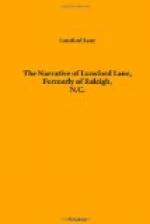THE NARRATIVE OF LUNSFORD LANE, FORMERLY OF RALEIGH, N.C.
Embracing an account of his early life, the redemption by purchase of himself and family from slavery, And his banishment from the place of his birth for the crime of wearing a colored skin.
Published By Himself.
Boston:
Printed for the Publisher:
J. G. Torrey, Printer.
1842
Narrative
of
Lunsford Lane.
[Original.]
The Slave Mother’s Address
to her
infant child.
I cannot tell how much I love
To look on thee,
my child;
Nor how that looking rocks
my soul
As on a tempest
wild;
For I have borne thee to the
world,
And bid thee breathe
its air,
But soon to see around thee
drawn
The curtains of
despair.
Now thou art happy, child,
I know,
As little babe
can be;
Thou dost not fancy in thy
dreams
But thou art all
as free
As birds upon the mountain
winds,
(If thou hast
thought of bird,)
Or anything thou thinkest
of,
Or thy young ear
has heard.
What are thy little thoughts
about?
I cannot certain
know,
Only there’s not a wing
of them
Upon a breath
of woe,
For not a shadow’s on
thy face,
Nor billow heaves
thy breast,—
All clear as any summer’s
lake
With not a zephyr
press’d.
TO THE READER.
I have been solicited by very many friends, to give my narrative to the public. Whatever my own judgment might be, I should yield to theirs. In compliance, therefore, with this general request, and in the hope that these pages may produce an impression favorable to my countrymen in bondage; also that I may realize something from the sale of my work towards the support of a numerous family, I have committed this publication to press. It might have been made two or three, or even six times larger, without diminishing from the interest of any one of its pages—indeed with an increased interest—but the want of the pecuniary means, and other considerations, have induced me to present it as here seen. Should another edition be called for, and should my friends advise, the work will then be extended to a greater length.
I have not, in this publication attempted or desired to argue anything. It is only a simple narration of such facts connected with my own case, as I thought would be most interesting and instructive to readers generally. The facts will, I think, cast some light upon the policy of a slaveholding community, and the effect on the minds of the more enlightened, the more humane, and the Christian portion of the southern people, of holding and trading in the bodies and souls of men.




